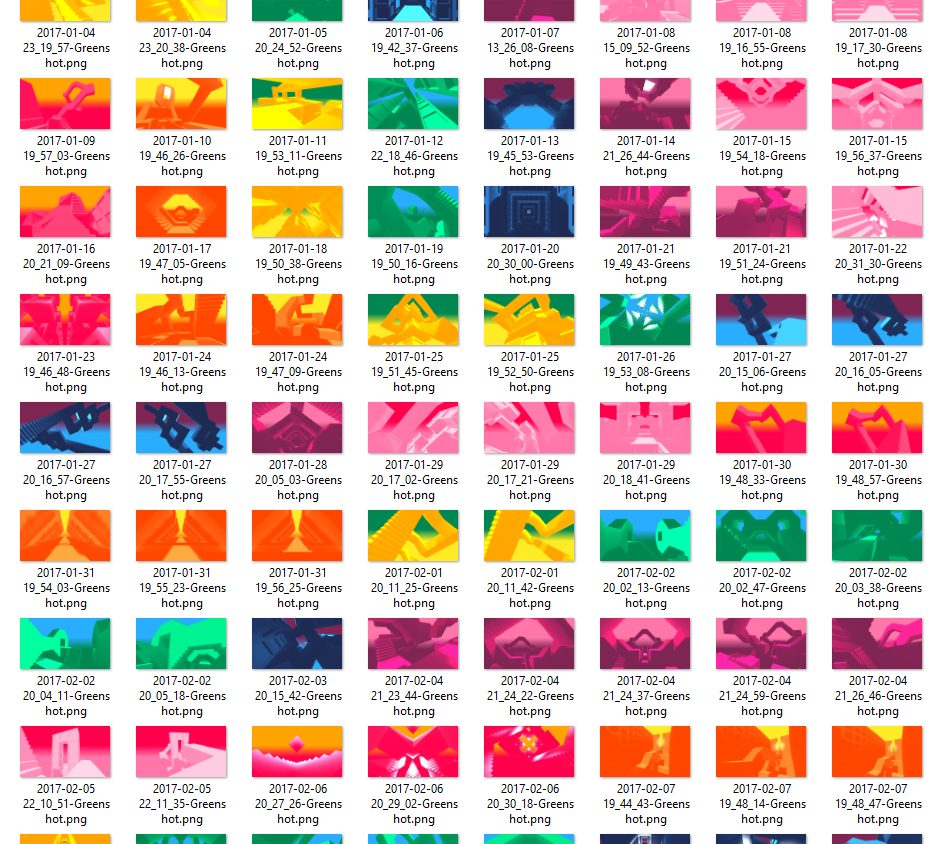Two months and 59 levels later, the show goes on. The thing I absolutely didn’t imagine when I started this so-called “abstract diary” is that players could use it as a kind of canvas to project their own thoughts and feelings, and actually make it their own diary. This is, as you can see below, what Petjeh’s doing, reflecting on the past month and the important things that happened to him during this time, while simultaneously playing the game.
To think I’m creating a game someone else can rely upon to express themselves is fantastic. And the most interesting thing is, in this way, A Road to Awe literally is an ambient game.
Ambient music must be able to accommodate many levels of listening attention without enforcing one in particular; it must be as ignorable as it is interesting.
Let’s misquote Brian Eno.
Ambient games must be able to accommodate many levels of attention without enforcing one in particular; they must be as ignorable as they are interesting.
That would hardly be possible with a gameplay more complex than just walking to the exit. What I find especially interesting is you can explore levels as a player, tile after tile, looking around, slowly, or click on the exit and become a spectator.
I know people who let the TV or the radio on while doing something else, not paying attention at all, yet having this need for a kind of background noise. Here, it seems A Road to Awe can fulfill this role, as something interactive enough to require a few clicks here and there, but not demanding enough to require full attention like most games do. This is a way of “gaming” I would have never thought about before starting this project, one that I didn’t even think possible. Now I’ll definitely have to push these interactive ambient boundaries further for future projects.
Sometimes I spin some ambient record, totally forget about it for hours, then suddenly realize there’s music playing, and that it has been good music because I forgot it. Ambient has the unique quality of being forgettable in a positive way, of stretching time, becoming time itself, at an unconscious level. I’d sure like to explore this kind of quality further in video games.
And now for something completely different: A Road to Awe’s statistics. They simply don’t make sense, or at least, not yet. There are days when the game is downloaded maybe 20 times. And sometimes, all of a sudden, it gets nearly 300 downloads. Except there’s no new traffic source. And no special day of the week. For now, I’m unable to spot any pattern. There are even days when the page views decrease but the downloads increase almost proportionally. Maybe some analytics guru would understand this better, but to me, it seems perfectly random. But hey, I like random.
I can still say there are more players now than in January. On January 31st, the game had been downloaded about 2400 times. Now, it has been downloaded 5800 times. Which mean 1000 times more in February than in January. Not bad at all! I have zero understanding about how the Itch page ranking works, but my guess is, the more downloaded a game gets, the higher it appears on the “top games” page.
Since my game is updated daily, it means naturally way more downloads than for most other games, so maybe that’s why it’s not buried in the bottomless pit of never played games yet. Yes, algorithms are our invisible masters, in case you doubted it.

I rarely take only one screenshot for a single section.
Let’s finish this monthly post by mentioning that I spend more than 15 minutes a day on A Road to Awe. It would mostly be 30 minutes. Why? Because stupid me didn’t count the time needed to take screenshots and post them on social networks. Taking a good screenshot isn’t that simple.
I could have decided that each screenshot would simply be the default starting position of every road section, but in many cases, that would have just resulted in an uninteresting colourful mess. So every day, I find myself playing the new road section long enough to find that perfect (or mostly, not too bad) shot. I could say, somehow, that marketing takes me as much time as developing. But you wouldn’t be reading this I weren’t taking this time.
See you next month!